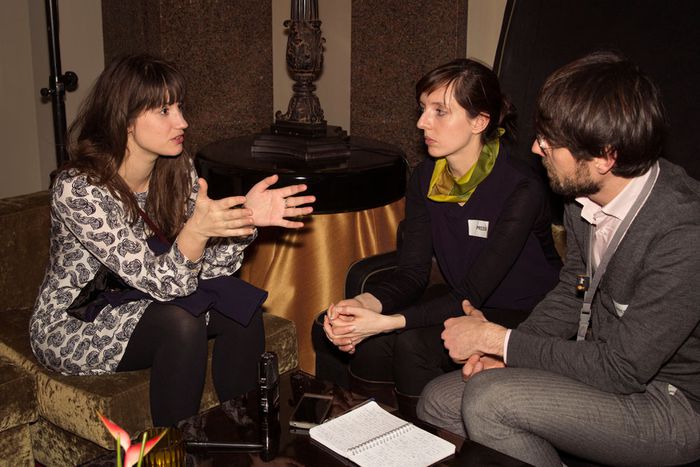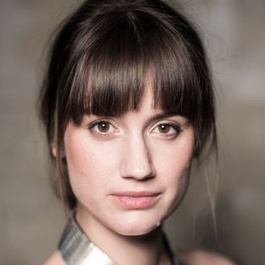
‘Madness is normal’: An Interview with Danica Curcic
Published on
Danica Curcic, a Danish actress with Serbian roots, brings out the best of her two cultures: the Balkan and the Scandinavian. Apart from taking part in several films that come out in the fall, she also plays classical Shakespearean male characters in theatre: Hamlet, King Lear and Othello. She wants it all.
Cafébabel: ‘Danica Curcic, Denmark’. Your Serbian name is representing Denmark in Berlin. Does it influence the way you are perceived in Denmark? Does your split, Serbian-Danish, identity influence your acting?
Danica Curcic: I was born in Belgrade and grew up in a Serbian home in Copenhagen. I was just one year old when we moved. My father got a job at the Yugoslav embassy in Copenhagen. It wasn’t meant to be here forever, but then the situation back home started to deteriorate, the war began and my parents decided to stay in Denmark.
I try to see growing up with two cultures, two different temperaments, with two very different ways of living as a great advantage.
The funny thing is that Danica means Denmark in Latin. It’s a total coincidence. My grandmother was also called Danica. It’s an old-fashioned Serbian name.
But the name as such doesn’t really influence the way people treat me. It’s more the way I look. I don’t look particularly Slavic or particularly Danish. Which is a good thing as it enables me to do both Danish and Slavic roles, but Denmark is a small country and actors from other countries like Turkey, Eastern Europe, or the Balkans do occasionally have problems during casting. Sometimes, I am also told that I am a bit too dark for a typical Danish girlfriend role.
'There was nothing that could stop me.'
Cafébabel: Was it a conscious decision to become an actress and what was the role of your family in it?
Danica Curcic: My parents have always supported me. Especially my education was very important for them. Danes often have a different mentality. They take a year off and travel. For my parents it has always been essential that I do well in school, have good grades. There was no place to debate that. Probably as a result of it, I started film and media studies at university when I was only 17 years old.
At a later stage, it became very clear to me that I should leave theoretical studies and become an actress. I thought: ‘This is it. This is my calling. I have to do this and I’m gonna make it and it’s gonna be amazing.’ I was so driven when I took the decision! There was nothing that could stop me.
Tell us a bit more about your current projects.
The current one is theater. I am working with three other actresses on a Shakespeare collage at the Royal Danish Theatre. It is the opposite of the theatre’s norms in Shakespeare’s own times, when men played women’s parts as well. I got the parts of Hamlet, King Lear and Othello.
 A lot of Shakespearean situations and characters repeat themselves. So our director and the dramaturg of the Royal Danish Theatre created a fascinating collage. Among others, Lady Anne from Richard the Third and Ophelia from Hamlet were combined into one scene. It makes a lot of sense as we’re a dealing with raw emotions as desire, jealousy or hatred in very clean situations. And still, I am very curious as to how it goes. We practically just started. It’s a unique opportunity for a woman actor to play maybe the most classical part of all times, that of Hamlet.
A lot of Shakespearean situations and characters repeat themselves. So our director and the dramaturg of the Royal Danish Theatre created a fascinating collage. Among others, Lady Anne from Richard the Third and Ophelia from Hamlet were combined into one scene. It makes a lot of sense as we’re a dealing with raw emotions as desire, jealousy or hatred in very clean situations. And still, I am very curious as to how it goes. We practically just started. It’s a unique opportunity for a woman actor to play maybe the most classical part of all times, that of Hamlet.
'The challenge is to make extreme characters as human as possible, to defend them.'
Are there any specific roles that you like playing?
I did this extreme character in The Absent One (2014) – a disturbed woman who has been a fugitive and walked around with her dead baby for ten years. That kind of role allows you to get into the depths of yourself that you wouldn’t normally do. The challenge of extreme characters is to make them as human as possible and to defend them.
Do you think madness is something unnatural or rather that normality is just an accepted form of madness?
It all depends on your point of view. As an actor, one has the advantage to be able to step in and out. You can do almost any character. The most important thing is to find the truth within oneself. Even a mad woman has this truth. The word ‘mad’ has negative connotations, but everything is a reaction to something that happened. Everything is a consequence of something else. In this way, madness is normal.
Do you have any upcoming projects in Serbia? Do you find anything interesting coming from the cinematic scene there?
For now, I don’t have anything planned in Serbia, but the film scene there is very promising. I watched the film Clip (2012) and found it to be very powerful and direct. A portrait of two different generations – the one stuck in nostalgia, the other trying to survive in a country that has been destroyed. I also can’t wait to see Krugovi (eng. Circles, 2013) with Nikola Rakocevic who is also a European Shooting Star this year. I heard it is really great.
Kusturica’s Underground is for me one of the biggest films ever made. I would love to work with him. I haven’t contacted him yet, but I think I should.
Cafebabel Berlin covers the 64. Berlinale Film Festival
 We love film and we've got a lot in the pipeline! You will find daily updates right here in the magazine or on Berlin.Babel.Blog and @CafeBabelBerlin. Expect exciting movie reviews, interviews with stars and photographic glances from the festival grounds.
We love film and we've got a lot in the pipeline! You will find daily updates right here in the magazine or on Berlin.Babel.Blog and @CafeBabelBerlin. Expect exciting movie reviews, interviews with stars and photographic glances from the festival grounds.



